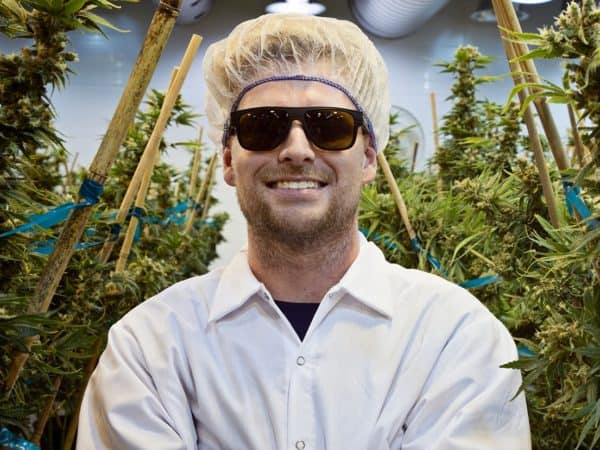
 Could Canadian marijuana become a global export?
Could Canadian marijuana become a global export?
For decades, illegal marijuana has made its way down to the United States from Canada. “B.C. Bud” is a brand name that resonates with recreational marijuana users from Seattle to Sarasota. But could Canada’s first mover advantage in the business of marijuana translate into an industry that we could ultimately export to the United States?
On April 1st of last year, new rules were introduced that changed the Canadian government’s approach to marijuana and laid the groundwork for what many think is the inevitable legalization of the substance here. In the meantime, a half-step was taken. Under the Marijuana for Medical Purposes Regulations (MMPR), Health Canada no longer supplies marijuana to those with a proven medical need but instead has tasked licensed commercial producers to do so.
NPR last week covered how Canada’s marijuana industry has become mainstream. Reporter Steve Henn profiled pot entrepreneur Brendan Kennedy, a Yale School of Management graduate who runs a private equity firm dedicated to buying and building marijuana businesses. Henn traveled with Kennedy to Nanaimo, where he marveled at how the medical marijuana space is being funded by banks, something that is completely unheard of in the United States.
“Unlike marijuana businesses in the U.S., Kennedy has a bank account and he can accept credit cards,” noted Henn. “But that is just the beginning of how banking has transformed this industry here. Kennedy and his competitors can also borrow….millions. To me, Kennedy’s ten-million dollar grow house looks a lot like a Silicon Valley server farm.”
Across the border, in Washington, Henn talked to Nate Loving, who sells marijuana in a legal retail business and says he is forced to get a money order for purchases as small as $130. He says he has to pay producers cash. “I’d like to be able to cut them a check,” he says.
In Canada, not only are banks financing the weed business, there are actually now publicly traded marijuana companies in Canada, meaning the general public is funding the industry.
Tweed Marijuana is one of thirteen companies that earned a license to grow medical marijuana through Health Canada. The company raised $30-million through an RTO last March. Its 150,000 square-foot medical marijuana facility in a former Hershey’s plant in Smiths Falls, Ontario. Tweed says it will charge between $5 and $12 a gram for its marijuana, depending on the strain of cannabis it delivers.
And Bedrocan Cannabis, which was formed in 2012 has roots that go back much further than that. The company is the Canadian licensee of Bedrocan BV, which has been a Dutch government-contracted licensed producer for the past 13 years.
Canada is charging ahead in the marijuana game. But in the U.S. despite the fact that state voters approved the personal use of small amounts of marijuana for recreational use in Colorado, Washington, and Oregon, some think widespread legalization in the more socially conservative country is still a long way off.
“The temptation is to conclude that the trend in favor of marijuana legalization is similar to the flow of opinion in favor of same-sex marriage, but not all hot-button social issues are created equal,” notes a recent study by William A. Galston and E.J. Dionne Jr. called “The New Politics of Marijuana Legalization: Why Opinion is Changing”. “It is much less clear that opinion on marijuana will follow the exact evolution of social issues such as marriage equality”.
So the question is, could Canada’s head start in the marijuana business allow us to cultivate business practices and techniques that we could export to the United States, once both countries legalize the substance?
The narrative is not without historical precedent, notes National Post editor Diane Francis. Francis describes the current setting as one of déjà vu.
“During Prohibition, Canadian Club and other liquors poured into the U.S. due to a loophole in Ontario and other provinces that allowed distilling and transportation to the border in Canada, but federal and provincial laws that forbid consumption,” says Francis, who notes that this gave rise to not one but two large “distillery conglomerates”, Hiram Walker and Seagram Corporation.
It’s likely that the raft of companies looking to establish a leadership position in Canada’s medical marijuana will roll up to a few in the years to come. Will these companies be larger, better, and more mature than their U.S. counterparts?
Daniel Pearlstein, an analyst with M Partners who has covered the medical marijuana space extensively, thinks that could be the case.
“Sure, the LPs here have been placed in a regulatory environment in which a small number of players can grow, and grow quickly, compared to some of the US states that have allowed more fragmented environments with many players that cannot grow to have the massive production capacity potential that the Canadian LPs have,” he says. “It’s likely that some of the LPs around today are still around 5-15 years from now, and if both the import/export rules were to change and the scheduling of cannabis in the US were to change, these players are likely to be in the position to export product or IP, or expand into the US.”
Bruce Linton, Co-founder, Chairman & Interim CEO of Tweed Marijuana thinks there’s more to Canada’s leadership position in the space than the headstart we enjoy, time-wise.
“The US system and the Canadian system are opposites of each other in a lot of ways,” he says. “Canada has stable federal regulation that affords us a number of advantages over the US, where the rules change drastically state to state. For starters, Canadian quality assurance regulations are much more rigorous”.
So in a world in which weed is legal what does Linton think the competitive landscape looks like?
“Canadian LPs will have a big advantage when it comes to our SOPs (Standard Operating Procedures) and how to grow high quality product that stands up to third party testing and an increasingly discerning consumer base. Two documentary film makers were recently visiting Tweed to do a cross-border comparison and they couldn’t believe the processes and procedures required to run a medical marijuana facility in Canada vs. the Wild West scenario they witnessed in Denver,” says Linton.
“Made in Canada” is a label that consumers worldwide look for on jars of maple syrup, containers of canola oil, on yoga pants, and on bottles of ice wine. One day soon, they may be looking to make sure their marijuana comes from the same place.
Comment
Leave a Reply
You must be logged in to post a comment.






 Share
Share Tweet
Tweet Share
Share




in terms of Cannabis, Canadians are more progressive in attitude and regulations. But in the same vein the long list of applicants that invest significant amounts of money for Cultivation licenses have been stymied by the bureaucratic procedure. In America I as many have concerns over the next Presidential election and the newly appointed Attorney General. believe its the voice of Physicians that will pave the way to legalization in America.
Totally agree with you. It’s time to come in USA real positive changes like this in Canada: https://cannasos.com/blog/user-post/marijuana-in-canada-pot-fiction-the-fifth-estate
To the victor go the spoils
This should apply to the Marijuana revolution as well.
We have them down and by the throat. Let’s finish ’em off NOW.
No licenses should go to people that weren’t involved in this victory.
Only those who lost jobs or were incarcerated etc should get our support $$$ Period. We are a cohesive group and if we boycott those pretenders shops, they will soon be out of business.
I read about one investor that owned over 60 licenses. Boo and boycott.
Those $30,000 licenses will be worthless real fast.